This article was co-authored by Trudi Griffin, LPC, MS. Trudi Griffin is a Licensed Professional Counselor in Wisconsin specializing in Addictions and Mental Health. She provides therapy to people who struggle with addictions, mental health, and trauma in community health settings and private practice. She received her MS in Clinical Mental Health Counseling from Marquette University in 2011.
There are 11 references cited in this article, which can be found at the bottom of the page.
This article has been viewed 43,401 times.
Depersonalization disorder, sometimes called depersonalization-derealization disorder or DDS, is a mental health condition where people feel like their bodies, thoughts, memories, or families aren’t their own. Sufferers may have episodes where these fears become overwhelming. This could result from a past trauma, or could simply occur on its own. While DDS often resolves itself over time, it’s still a very scary thing to experience and you’ll naturally want to alleviate your condition any way you can. If you’re hesitant to take medication, then there are a few natural steps you could take to manage DDS. However, it’s still very important to consult a mental health professional before trying these remedies. They can design the best treatment regimen to help you feel better.
Steps
Self-Care Techniques
Depersonalization is a stressful, scary thing to experience. While there are no definitive cures, there are steps you can take in your everyday life to manage the condition. Some of these can boost your mood, some can keep you physically healthy, and a few could reduce the number of episodes you experience. The main thing to remember is that these treatments aren’t a substitute for professional mental health counseling. If you do experience depersonalization, or any other mental health problem, then you should speak with a professional first and follow their instructions.
-
1Educate yourself about the condition. The fear of the unknown is very powerful. Try to read up about depersonalization and understand how it operates. This can help you recognize its main symptoms and react to episodes more effectively.[1]
- Use high-quality sources like Mayo Clinic, the National Institutes of Health, or the National Alliance on Mental Health.
- You could also look for testimonies from people with the condition so you don’t feel alone.
-
2Take steps to reduce your stress and anxiety. DDS is sometimes a result of other anxiety disorders, and high stress could trigger an episode. Do your best to reduce your stress to improve your condition.[2]
- Deep breathing exercises are usually effective for reducing anxiety. If you feel your stress rising, excuse yourself to take some deep breaths.
Advertisement -
3Meditate to increase your mindfulness. Being more aware of yourself can help you overcome episodes. Set some time aside each day for silent meditation to practice controlling your mind.[3]
- Meditation is also a great stress-reducing activity.
-
4Talk to your friends and family about the condition. It’s easy to feel alone with a condition like DDS, so keep your social circle intact. Include your friends and family in your life and keep them informed about your condition.[4]
- You could also give them some things to read so they can educate themselves on the condition. This can help them support you better.
-
5Join a support group or community. Even if your friends and family are supportive, they still probably don’t entirely understand what you’re going through. Try to connect with some other DDS sufferers to talk to people who know what you’re experiencing. This way, you’ll feel less alone.[5]
- Try searching online for nearby support groups that you could join.
-
6Exercise regularly to keep yourself healthy. Physical activity has a positive effect on your mental health, so try to get some exercise every day. Even taking a walk is a great way to stay active.[6]
- Playing sports is a great way to stay active and connect with other people at the same time.
-
7Follow a balanced diet. A good diet also tends to benefit your mental health. Try to include as many fresh fruits and vegetables, lean proteins, and whole grain products in your diet as possible. Limit your intake of sugary or processed foods to avoid depressing your mood.[7]
- Since caffeine can increase anxiety, it might make your condition worse. If you notice any problems after drinking caffeine, limit your intake or cut it out entirely.
-
8Avoid using drugs, alcohol, or other substances. Mind-altering substances can actually trigger dissociative episodes, so it’s best to avoid them altogether.[8]
- It might be tempting to self-medicate with substances to deal with your condition, but this could lead to a dangerous addiction.
Handling an Episode
Even if you attend therapy and manage your DDS symptoms well, you might still have episodes occasionally. During an episode, you might feel like your body, memories, thoughts, friends, or family aren’t really yours. This is very scary, but a few treatment tricks could make your episodes less severe. If your episodes are too much to handle, then contact your therapist or another mental health professional right away for further help.
-
1Monitor your feelings to identify an episode starting. Being aware of yourself can help you spot an episode starting. Some common symptoms include feeling like you’re not in control of your body, emotion or physical numbness, loss of memories or emotions, and feeling disconnected or unfamiliar with people around you.[9]
- Remember that the symptoms are different for every person. Pay attention to your particular symptoms to spot episodes.
-
2Accept that these feelings are part of your condition. There is some evidence that fighting or suppressing DDS symptoms can actually make them worse. If you’re experiencing an episode, tell yourself that it’s just your condition and you’ll overcome it.[10]
- Try repeatedly telling yourself something like, “I know this is my condition, and it’s okay.”
-
3Focus on some activities that you enjoy. Keeping yourself distracted is a great way to overcome an episode. Do hobbies that make you happy to raise your mood and distract yourself from the episode.[11]
- It’s possible that you’ll feel disconnected to your hobbies during an episode. You might have to force yourself to do what you enjoy.
-
4Exercise to distract yourself. Exercise is an excellent distraction that many people with DDS use to overcome their episodes. Try going for a walk or run if you’re feeling overwhelmed.[12]
-
5Read out loud to occupy your brain. Since reading is a complex task, doing it out loud could keep your brain occupied so you can’t focus on your episode. This can help you calm down.[13]
-
6Call emergency services if you feel suicidal. If you’re feeling especially overwhelmed, then you might have suicidal thoughts. In this case, it’s very important to call emergency services or your therapist for help.[14]
- You could also reach out to a family member, friends, or support group member if you need help.
Different Therapy Types
If you do experience depersonalization, then it’s very important to seek professional mental health counseling, even if you’re taking these other steps to manage the condition. There are several therapies that could help treat your DDS, so follow your counsellor’s treatment suggestions. Some of these therapies use natural methods like talk therapy, but some therapists may want you to complement your treatment with medication. It’s very important to follow the treatment regimen that your therapist prescribes for you.
-
1Undergo psychotherapy to identify the cause of your issue. Psychotherapy, or “talk therapy,” is the most common treatment type for DDS. A therapist will talk you through your feelings and symptoms to reveal why you’re experiencing depersonalization.[15]
- Psychotherapy is useful if you’ve experienced traumatic events in the past. These can lead to suppressed emotions that cause DDS.
-
2Re-train your brain’s response with cognitive-behavioral therapy (CBT). CBT is a most active form of therapy that changes the way you respond to and interpret emotions. The aim is to stop patterns of negative thinking and behavior.[16]
- CBT is also very useful for depression and anxiety disorders. Since many people with depersonalization also experience these issues, CBT could improve your overall mental health.
-
3Process negative emotions with dialectical-behavior therapy (DBT). DBT is a form of psychotherapy that was designed for people who have experienced significant trauma in the past. The aim is to help you accept, understand, and process that trauma and prevent it from affecting you in the future.[17]
-
4Avoid nightmares with eye movement desensitization and reprocessing (EMDR). This therapy type helps you take control of rapid eye movements. This might help you avoid nightmares and flashbacks, so try this therapy if you experience these symptoms.[18]
-
5Try clinical hypnosis to unlock hidden feelings. This treatment is less definitive than other therapy types, but it’s possible that hypnosis could help you unlock and process trauma that you’ve experienced. It could also help train your brain to process negative feelings more effectively and avoid future episodes.[19]
- Only visit a licensed and experienced hypnotist. There are some amateur coaches who claim to be hypnotists, but they lack the training of a professional and could even harm you.
Medical Takeaways
Staying healthy, distracting your mind, increasing your mindfulness, and maintaining a social support network are all great ways to treat depersonalization disorder. However, while there are a few natural steps you could take to manage DDS, there really is no substitute for professional mental health counseling. The right therapy, paired with lifestyle changes and possibly medication, could make a dramatic difference in your life. Follow your therapist’s suggestions to improve your condition and move on with your life.
References
- ↑ https://www.merckmanuals.com/home/mental-health-disorders/dissociative-disorders/depersonalization-derealization-disorder
- ↑ https://www.bmj.com/content/356/bmj.j745
- ↑ https://my.clevelandclinic.org/health/diseases/9791-depersonalization-disorder/management-and-treatment
- ↑ https://www.mayoclinic.org/diseases-conditions/depersonalization-derealization-disorder/diagnosis-treatment/drc-20352916
- ↑ https://www.mayoclinic.org/diseases-conditions/depersonalization-derealization-disorder/diagnosis-treatment/drc-20352916
- ↑ https://www.apa.org/pubs/journals/releases/amp-66-7-579.pdf
- ↑ https://www.apa.org/pubs/journals/releases/amp-66-7-579.pdf
- ↑ https://www.bmj.com/content/356/bmj.j745
- ↑ https://www.mayoclinic.org/diseases-conditions/depersonalization-derealization-disorder/symptoms-causes/syc-20352911
- ↑ https://www.nami.org/Blogs/NAMI-Blog/January-2020/A-Blueprint-to-Healing-From-Depersonalization
- ↑ https://psychcentral.com/lib/10-simple-ways-to-relieve-depersonalization/
- ↑ https://www.mind.org.uk/information-support/your-stories/depersonalisation-my-four-months-of-terror/
- ↑ https://psychcentral.com/lib/10-simple-ways-to-relieve-depersonalization/
- ↑ https://www.nhs.uk/conditions/dissociative-disorders/
- ↑ https://www.mayoclinic.org/diseases-conditions/depersonalization-derealization-disorder/diagnosis-treatment/drc-20352916
- ↑ https://my.clevelandclinic.org/health/diseases/9791-depersonalization-disorder/management-and-treatment
- ↑ https://my.clevelandclinic.org/health/diseases/9791-depersonalization-disorder/management-and-treatment
- ↑ https://www.nami.org/About-Mental-Illness/Mental-Health-Conditions/Dissociative-Disorders
- ↑ https://my.clevelandclinic.org/health/diseases/9791-depersonalization-disorder/management-and-treatment
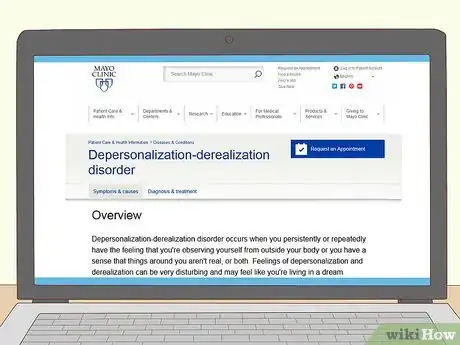








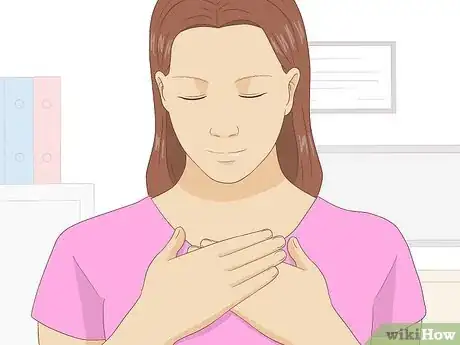





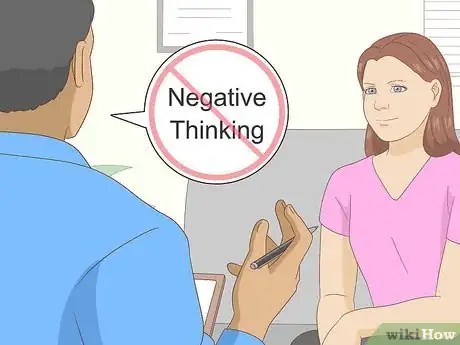

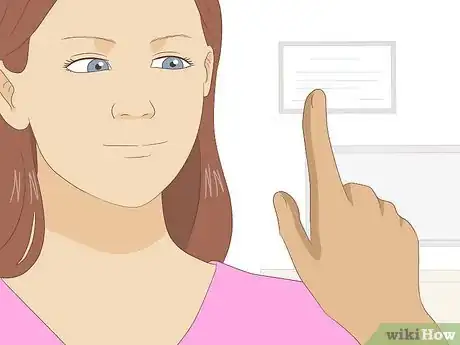
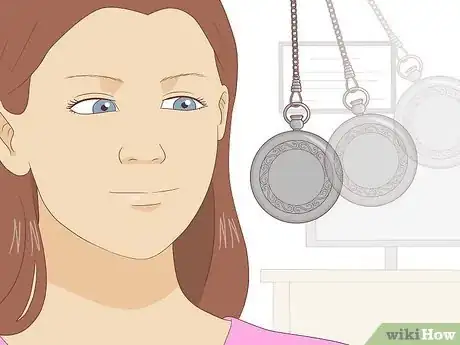



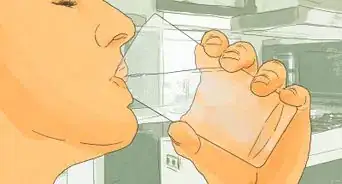




-Step-17-Version-2.webp)















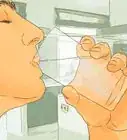




































Medical Disclaimer
The content of this article is not intended to be a substitute for professional medical advice, examination, diagnosis, or treatment. You should always contact your doctor or other qualified healthcare professional before starting, changing, or stopping any kind of health treatment.
Read More...